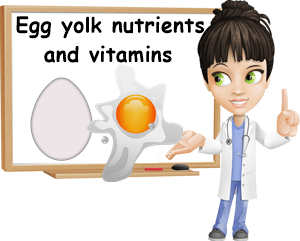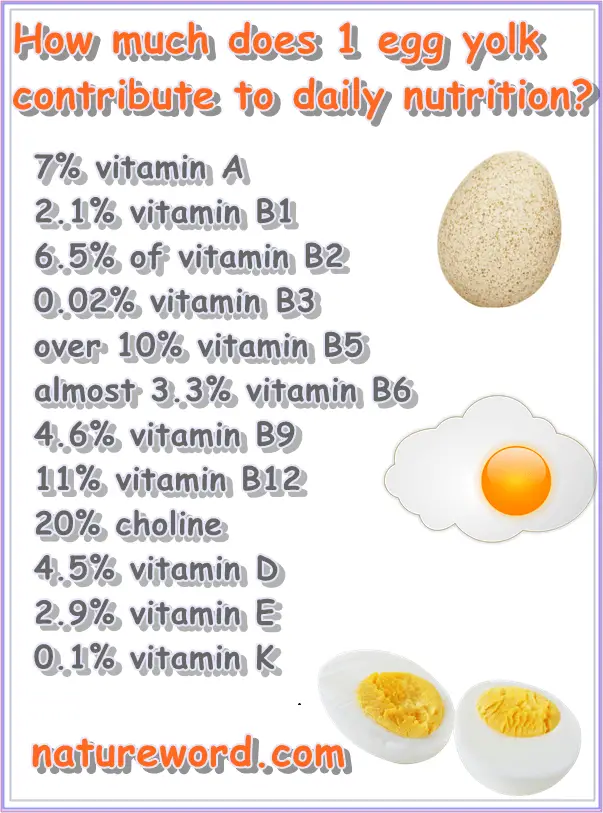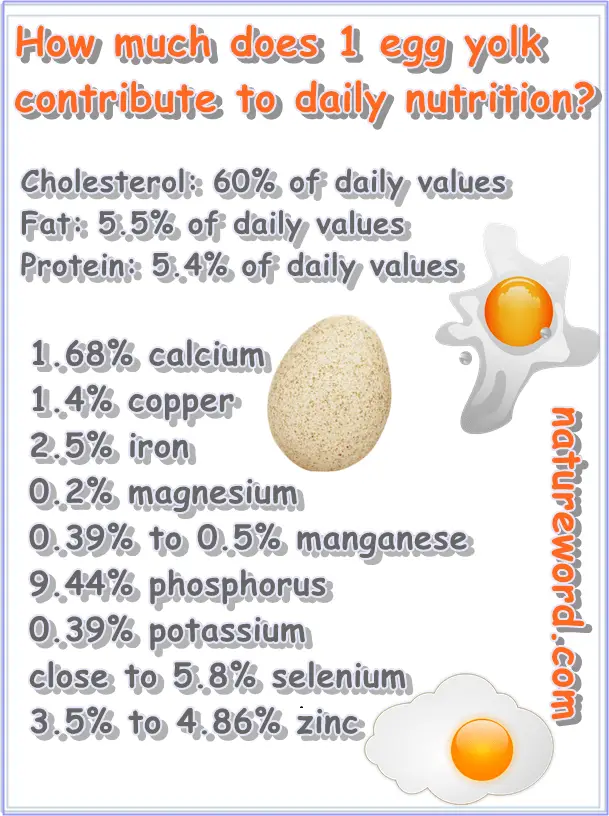What is the nutrition of one egg yolk? How much fat in one egg yolk? How much protein in one egg yolk? How much cholesterol in one egg yolk? How many vitamins in one egg yolk? Discover what nutrients and vitamins you get from eating just one egg yolk, and how much one yolk contributes to your daily nutrition.
Egg yolks from medium sized chicken eggs weigh an average of 17 grams and represent about one third of the weight of the whole egg. The yolk itself provides all the cholesterol content of the egg, and almost all of the fat. As a result, it is higher in calories than the egg white, despite the egg white being two thirds of the whole egg. The yolk houses all of the fat soluble vitamins in the egg, and most of the content of other vitamins and minerals which is why it’s also the source of many benefits for health.
See the wonderful benefits of egg yolk.

Egg yolk: nutrition facts per 1 egg yolk, raw
Nutrition data for one egg yolk from chicken eggs (estimated weight: 17 grams per yolk).
- Energetic value: 55 kcal (kilocalories)
- Carbohydrates content: 0.6 g (grams)
- Sugar content: under 0.01 g
- Fiber content: 0 g
- Protein content: 2.7 g
- Fat content: 4.5 g
- Cholesterol content: 184 mg (milligrams)
- Water content: 8.9 g
Vitamins in one egg yolk:
- Vitamin A: 64.8 mcg (micrograms) of which 63 mcg retinol (preformed vitamin A)
- Vitamin B1: 0.03 mg
- Vitamin B2: 0.09 mg
- Vitamin B3: 0.004 mg
- Vitamin B5: 0.508 mg
- Vitamin B6: 0.059 mg
- Vitamin B9: 24.8 mcg
- Vitamin B12: 0.332 mcg
- Choline: 139 mg
- Vitamin C: 0 mg
- Vitamin D: 0.9 mcg
- Vitamin E: 0.439 mg
- Vitamin K: 0.119 mcg
Minerals in one egg yolk:
- Calcium: 21.9 mg
- Copper: 0.013 mg
- Iron: 0.464 mg
- Magnesium: 0.85 mg
- Manganese: 0.009 mg
- Phosphorus: 66.3 mg
- Potassium: 18.5 mg
- Selenium: 9.52 mcg (micrograms)
- Sodium: 8.16 mg
- Zinc: 0.39 mg
Nutrition data from USDA.gov.

Egg yolk: nutrition facts per 1 egg yolk, cooked
Nutrition data for one cooked (boiled) egg yolk from chicken eggs (estimated weight: 17 grams per yolk).
- Energetic value: 54.6 kcal
- Carbohydrates content: 0.0609 g
- Sugar content: 0.095 g
- Fiber content: 0 g
- Protein content: 2.69 g
- Fat content: 4.5 g
- Cholesterol content: 184 mg
- Water content: 8.87 mg
Vitamins in one egg yolk:
- Vitamin A: 64.6 mcg (micrograms) of which 62.9 mcg retinol (preformed vitamin A)
- Vitamin B1: 0.024 mg
- Vitamin B2: 0.085 mg
- Vitamin B3: 0.004 mg
- Vitamin B5: 0.508 mg
- Vitamin B6: 0.056 mg
- Vitamin B9: 18.5 mcg
- Vitamin B12: 0.265 mcg
- Choline: 111 mg
- Vitamin C: 0 mg
- Vitamin D: 0.9 mcg
- Vitamin E: 0.437 mg
- Vitamin K: 0.119 mcg
Minerals in one egg yolk:
- Calcium: 21.9 mg
- Copper: 0.013 mg
- Iron: 0.462 mg
- Magnesium: 0.85 mg
- Manganese: 0.009 mg
- Phosphorus: 66.1 mg
- Potassium: 18.5 mg
- Selenium: 9.49 mcg (micrograms)
- Sodium: 27.9 mg
- Zinc: 0.389 mg
Nutrition data from USDA.gov.
The difference in nutrition between raw egg yolk and cooked egg yolk is minimal. Raw and cooked egg yolks have almost the same nutritional value. Also see the nutrition facts of egg yolk per 100 g.

Egg yolk fatty acids composition and profile:
Unsaturated fat:
- Oleic acid: 47%
- Linoleic acid: 16%
- Palmitoleic acid: 5%
- Linolenic acid: 2%
Saturated fat:
- Palmitic acid: 23%
- Stearic acid: 4%
- Myristic acid: 1%
How much of daily values does one egg yolk provide?
One egg yolk provides 184 mg (milligrams) of cholesterol. The average adult can eat 300 mg of cholesterol per day, so just one egg yolk supplies over 60% of the daily recommended intake, RDI, of cholesterol.
One egg yolk has 4.5 g (grams) of fat. The average adult on a 2000 kcal diet can eat up to 78 g of fat per day. One yolk provides over 5.5% of the total daily fat intake.
One egg yolk provides 2.7 g (grams) of protein. The average adult needs an estimated of 50 grams of protein per day. Just one yolk provides 5.4% of daily protein requirements.
Other daily values of vitamins and nutrients from one egg yolk:
- 7% of the daily recommended intake of vitamin A
- 2.1% vitamin B1
- 6.5% of vitamin B2
- 0.02% vitamin B3
- over 10% vitamin B5
- almost 3.3% vitamin B6
- 4.6% vitamin B9
- 11% vitamin B12
- 20% choline
- 4.5% vitamin D
- 2.9% vitamin E
- 0.1% vitamin K
- 1.68% calcium
- 1.4% copper
- 2.5% iron
- 0.2% magnesium
- 0.39% to 0.5% manganese (values for men and women)
- 9.44% phosphorus
- 0.39% potassium
- close to 5.8% selenium
- 3.5% to 4.86% zinc (values for men and women)
